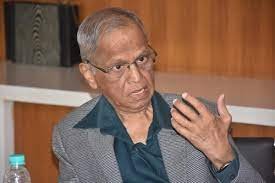
NR Narayana Murthy, the esteemed founder of Infosys, has triggered a widespread debate on work culture by endorsing a 70-hour work week. During a podcast appearance, Murthy emphasized India’s need to enhance work productivity to remain competitive on the global stage. Drawing parallels with Japan and Germany, two nations that adopted extended work hours post-World War II, he urged the youth to contribute to fostering such a culture.
Notably, this is not the first time Narayana Murthy has called for extended working hours. In 2020, he encouraged Indian professionals to work 60 hours a week for the next two to three years to revive the economy in the aftermath of the pandemic.
In a surprising show of support, Bhavish Aggarwal, the CEO of Ola, endorsed Murthy’s advice, suggesting that it’s the perfect opportunity to “go all in” and build in one generation what other countries have accomplished over multiple generations.
Jack Ma, the visionary founder of Alibaba, once endorsed the controversial “996” rule within China’s tech industry. This rule entails working from 9 am to 9 pm six days a week and is prevalent in many of the country’s leading technology firms and startups. Ma’s comments sparked debate, with critics expressing concerns about its impact on family life and personal well-being.
Elon Musk, the world’s wealthiest individual and CEO of multiple companies, took an even more extreme stance when he acquired Twitter in October last year. Musk urged his staff to commit to more than 100 hours of work per week, stressing that “extreme dedication” was essential for Twitter’s success. Musk, who occasionally sleeps in the office, expected his employees to adopt a similarly demanding work ethic.
Shantanu Deshpande, CEO of Bombay Shaving Company, also joined the conversation by suggesting that freshers should work 18 hours per day, emphasizing the importance of hard work and dedication.
The debate on extended work hours extends beyond national borders. A survey conducted by Harvard Business Review in 2018 revealed that CEOs in the United States work an average of 9.7 hours per weekday, with additional hours on weekends and during vacations. In India, a survey of 357 CEOs of listed manufacturing firms conducted by the International Growth Centre found that the average Indian CEO works approximately 39 hours a week, translating to nearly 8-9 hours per weekday.
Narayana Murthy’s call for a 70-hour work week has ignited discussions on the evolving dynamics of work culture, striking a balance between productivity and employee well-being, and the global landscape of work ethics and dedication. The opinions of global CEOs reflect the ever-evolving conversation surrounding the nature of work in today’s fast-paced world.
Sources By Agencies

